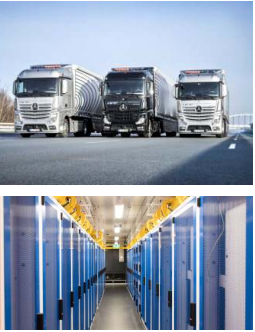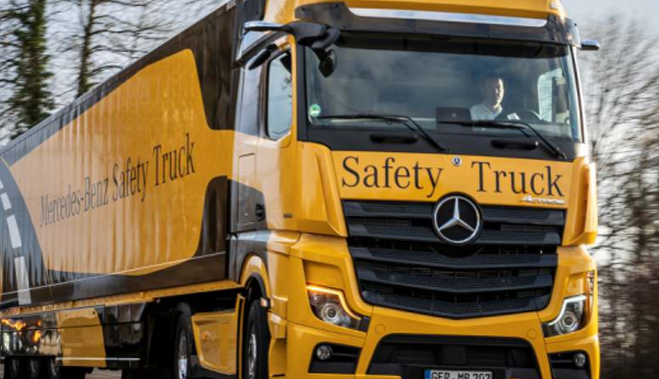Daimler Truck focusing on fuel cells
Daimler Truck Fuel Cell GmbH & Co. KG brings together all of the Group’s fuel cell activities for heavy-duty commercial vehicles and other applications such as stationary use and plans to partner with Volvo Group for series production project
The world’s largest truck manufacturer, Daimler Truck AG, which brings seven top brands under one roof: Bharat Benz, Freightliner, Fuso, Mercedes-Benz, Setra, Thomas Built Buses and Western Star, which delivered more than 500,000 trucks and buses to customers in 2018, recently formed a new company focusing on developing and harnessing the potential of fuel cells in today’s modern global transport industry.
 Daimler Truck AG said Daimler Truck Fuel Cell GmbH & Co. KG will bring together all of the Group’s fuel cell activities for heavy-duty commercial vehicles and other applications such as stationary use.
Daimler Truck AG said Daimler Truck Fuel Cell GmbH & Co. KG will bring together all of the Group’s fuel cell activities for heavy-duty commercial vehicles and other applications such as stationary use.
Founded more than 120 years ago, Daimler is one of the largest global commercial vehicle manufacturers with more than 35 primary facilities and about 100,000 employees worldwide. Analysts view its investment on fuel cells as a major game changer in the industry.
New milestone
With the establishment of Daimler Truck Fuel Cell GmbH & Co. KG, the organizational and legal framework has now been created for bringing together all of the Group’s fuel cell activities, including the series production of fuel cell systems.
Daimler Truck AG appointed Dr. Andreas Gorbach (45) and Prof. Dr. Christian Mohrdieck (60) as managing directors of the new company. Both have extensive experience with conventional and alternative drive systems, especially fuel cell systems.
Gorbach has already held a senior management position with overall responsibility for all fuel cell matters at Daimler Truck AG since the beginning of May this year. This will continue in his new additional position as CEO of Daimler Truck Fuel Cell GmbH & Co. KG. Prof.
 Dr. Christian Mohrdieck has been in charge of fuel cell development at the Daimler Group since 2003 and is the managing director of the current fuel cell development unit Mercedes-Benz Fuel Cell GmbH, which will be allocated to the newly founded subsidiary.
Dr. Christian Mohrdieck has been in charge of fuel cell development at the Daimler Group since 2003 and is the managing director of the current fuel cell development unit Mercedes-Benz Fuel Cell GmbH, which will be allocated to the newly founded subsidiary.
Partnership with Volvo Group
In April, Daimler Truck AG concluded a preliminary, non-binding agreement with Volvo Group to establish a new joint venture for the development, production and commercialization of fuel cell systems for heavy-duty commercial vehicles and other applications such as stationary use.
Daimler Truck Fuel Cell GmbH & Co. KG is later to transition into this planned joint venture. Volvo Group will acquire 50 percent of the company for this purpose. All potential transactions are subject to examination and approval by the responsible competition authorities.
Daimler Truck AG and Volvo Group plan to start series production of heavy-duty fuel cell commercial vehicles for demanding and heavy long-distance haulage in the second half of the decade.
“The fuel cell is a crucial CO2-neutral solution for trucks in heavy long-distance transport. We and our future joint venture partner, Volvo Group, are convinced of this. We are determined to jointly tackle the development and series production of fuel cells and are now taking major steps with all the necessary preparations for the planned joint venture,” said Martin Daum, Chairman of the Board of Management of Daimler Truck AG and Member of the Board of Management of Daimler AG.
“The establishment of Daimler Truck Fuel Cell GmbH & Co. KG is a very special milestone for our company, because our new subsidiary is to be the immediate predecessor organization of the joint venture. In it, we will now bring together the great expertise and enormous wealth of experience from several decades of development work on fuel cells at Daimler – and combine it with the right know-how in connection with trucks,” he added.
Planned cooperation with Rolls-Royce plc
The cooperation planned between Daimler Truck AG and the British technology group Rolls-Royce plc in the field of stationary fuel cell systems demonstrates very specific opportunities for the commercialization of fuel cell technology through the planned joint venture with Volvo Group.
Rolls-Royce’s Power Systems division plans to use the fuel cell systems from the planned joint venture between Daimler Truck AG and Volvo Group and Daimler’s many years of expertise in this field for the emergency power generators of the MTU product and solution brand that it develops and sells for data centers. A comprehensive cooperation agreement is to be prepared and signed by the end of the year.
Daimler Truck AG and Rolls-Royce plc plan to cooperate on stationary fuel-cell generators as CO2-neutral emergency power generators for safety-critical facilities such as data centers. They are to offer emission-free alternatives to diesel engines, which are currently used as emergency power generators or to cover peak loads.
The Rolls-Royce Power Systems business unit plans to rely on these fuel-cell systems from the planned joint venture – as well as Daimler’s many years of experience – in the emergency power generators it develops and distributes for data centers under the MTU product and solution brand.
Daimler and Rolls-Royce are linked not only by longstanding cooperation on conventional drive systems for other applications.
At the end of last year, Rolls-Royce Power Systems and Lab1886, Daimler’s innovation unit for new business models, had already agreed on a pilot project to develop a demonstrator for the use of this technology for stationary power supply on the basis of fuel-cell modules from the automotive sector. It will go into operation in Friedrichshafen by the end of this year.
“For Daimler Truck AG, fuel-cell systems play a decisive role in achieving CO2-neutral transport – as a supplement to battery-electric drive. Just at the end of April, we announced our intention to establish a joint venture with the Volvo Group. With the agreement for stationary fuel-cell systems concluded, we are already demonstrating very concrete opportunities for the commercialization of this technology through the joint venture,” stated Martin Daum, Chairman of the Board of Management of Daimler Truck AG and Member of the Board of Management of Daimler AG.
“We are delighted that Rolls-Royce is as convinced as we are of the future of fuel cells in the stationary sector and would like to enter into this long-term cooperation with us. On the one hand, this represents further impetus for the development of a hydrogen infrastructure across all sectors and applications; on the other hand, it will enable us to work together to further increase the economy of fuel cells, as well as society’s acceptance of and confidence in them,” continued Martin Daum.
Andreas Schell, CEO of Rolls-Royce Power Systems, said fuel cells will play a key role in the decarbonization of drive systems which is important in protecting the environment.
“Data centers are the nodes of the global information and communication network, whose vital importance has become particularly clear in these difficult times and whose operation must therefore be reliably safeguarded. The same applies to other safety-critical systems. Under our MTU brand, we develop customized solutions, thousands of which we have already installed, for data centers’ individual, complex and growing energy needs,” said Schell.
“The decarbonization of drive systems and power supply is one of our central strategic goals and fuel cells will play a key role in this. No other technology offers such high reliability, modular scalability and all the advantages of renewable energies without dependence on the conventional energy market. Through the cooperation with Daimler Trucks, we will gain access to fuel-cell systems that meet our demanding requirements and will thus further strengthen our outstanding position in this growth market,” he added.
Over the past two decades, Daimler has already built up considerable expertise in the field of fuel cells at its site in Nabern, Germany (currently the headquarters of Mercedes-Benz Fuel Cell GmbH) and at other production and development facilities in Germany and Canada.










